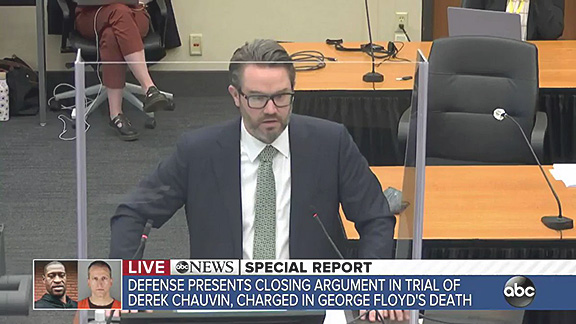Reviewing the Reviews
I wrote, and, after the verdict came in in the Derek Chauvin trial, rewrote this paragraph on April 20. On April 19, I listened to some of the defense attorney Eric Nelson’s closing arguments and then, to MSNBC commentators review of the defense summation suggesting it was too long, going “on and on,” and throwing everything and anything at the wall hoping something might stick. The summation I heard was a detailed multi-media presentation that combined excerpts of Minneapolis PD procedural text with an eyewitness, expert, and audio and video testimony taken from a perspective facing the passenger’s side of the police car. Nelson’s timeline of events started about 16 minutes before the young woman whose perspective faced the driver’s side of the police car started filming the single continuous powerful video of George Floyd with Derek Chauvin’s knee on his neck.

The jury has spoken.
The reviewers are reviewing.
Moving on.
Minute by minute, day by day, people repeat practices handed down to them by those who went before. We don’t all start in the same place or have access to the same information even if we inhabit the same time and place. The guiding texts in which many people place their faith reflect interpretations and use wording developed in specific places, during times when people could not know some things that they could know now. Ask yourself how you avoided COVID in 2019. Since 2020, how many of us have suffered common colds?
End-of-story conclusions don’t require the time and focus necessary to consider multiple simultaneously occurring factors. People develop perceptual styles early in life amid positive and negative reinforcement, looking to others for approval at home, in school, in the neighborhood, and at work. We depend on our parents for food. At work, we depend on positive salary reviews from our bosses. We ignore their gut feelings when authorities, situations, and accepted practices require it. Many people never question why they do this.
Some do. Some change.
Memoirist Tara Westover will speak online on May 18 as part of the Friends of the Central Library Rosamond Gifford Author Series. Tara Westover’s 2018 memoir “Educated,” details her early life growing up in a strict, fundamentalist, survivalist Mormon family in Idaho. Tara’s family life, schooling, religious training, and early work experience all take place at home. Tara helps her mother prepare herbs and deliver babies; with her brother, she works sorting metal in her father’s scrap business. Tara’s parents teach Tara not to avoid danger and injury, but rather to accept avoidable injury and pain as part of God’s plan.

Tara manages to glimpse possibilities beyond the dangerous environment in which she lives. Spoiler: When Tara’s worldly snowbird grandmother offers Tara the opportunity to travel south and enroll in public school, Tara prepares to sneak away. But on the appointed day, guided by her parents’ isolationist beliefs, Tara stays put. Her grandmother drives away without her.
Opportunity knocks again; Tara applies to Brigham Young University, an institution familiar with home-schooled students. At BYU, Tara starts to learn how much she doesn’t know. She’d never heard of the Holocaust.
On trips home, Tara returns to a family suffering from injured brains and miswired thinking. After another mishap, Tara seeks professional medical attention for her brother Shawn when she sees exposed brain tissue through a fracture in his skull. The physician tells Tara that Shawn’s brain tissue is fine; the bone will grow back; but also, that it’s the brain injuries you don’t see that cause ongoing problems. Shawn is violent, unpredictable, and self-medicates.
In family arguments and public conflicts, observers observe. Observers develop different perceptions of what they observe based on their differing perspectives relative to the facts. Not all facts are visible. Individual physiology is a fact that isn’t visible. Our own internal homeostasis is invisible to ourselves and others. We are just now learning how neurochemically detailed individuals and shared consciousness is. Ours is a society geared toward controlling feelings: our own and everyone else’s.

When I first heard about “Educated,” I read a February 29, 2020 review in the conservative publication “National Review.” The reviewer wrote that Tara Westover’s memoir was overly self-focused in dredging up traumatic events and feelings, that “Educated,” was not the right path to healing. The reviewer further wrote that, in telling her story without coming full circle, Tara Westover told her story at the wrong time.
Memoirs are personal remembrances with distinct points of view. Not all ongoing life stories can or should come full circle arriving at finite conclusions about everyone and everything.
Life is ongoing.
Learning and change are lifelong.
Peace.











